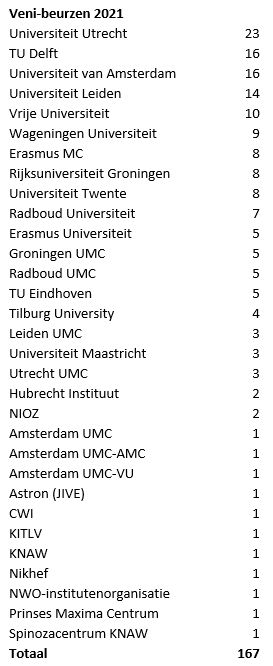60 of the winners are in social sciences and humanities and 18 are in applied and technical science fields. The grants will allow each of them to further develop their research ideas over the next three years.
Awarding the Veni grants was thrown into considerable turmoil last year because of Covid and a big hack at NWO. This meant that the only grants that could be awarded in December were those in the exact and natural sciences (ENW), and in health research and innovation in healthcare (ZonMw) – 89 in total.
In the first round, TU/e was awarded three Veni grants and now five more are on the books. This brings the total for 2022 to eight, which is equal to the highest number that TU/e has ever received. An overview of the distribution of the Veni grants per institution in this round can be found at the bottom of this article.
Preselection
In order to prevent unnecessary effort, NWO works with a shortened pre-proposal phase. The funding body then makes a first selection from that pool so that fewer researchers spend unnecessary time preparing and submitting extensive grant applications. Only the exact and natural sciences domain has not yet instituted this preselection phase.
A total of 1,280 applications were submitted across all four domains in 2021, of which 759 were submitted as full applications, mostly after passing NWO’s preselection phase. Of those, NWO has funded 167. This is 13 percent of the total number of submissions and 22 percent of the full applications.
The Veni grants are part of NWO’s Talent Programme. Junior researchers are eligible for a Veni grant, while senior researchers have access to the Vidi grant and those at the top of the field can apply for Vici funding grants.
Eindhoven Veni's
The five Veni recipients from TU/e explain their projects in their own words:
Learning the future of complex decisions: a new mathematical approach
dr. Albert Schrotenboer (Department Industrial Engineering & Innovation Sciences)
Organizations make complex decisions while the future is uncertain. For example, inner-city stores are replenished by trucks before sales are known, and ICU beds are reserved each day before COVID-19 patient inflow is known. To make good decisions, organizations account for a decision's impact on the future.
Schrotenboer develops a fundamentally new mathematical approach to quantify such a decision’s future impact by combining Mathematical Programming and Machine Learning methods. This helps organizations to make better decisions resulting in, for example, less nuisance and pollution in inner-cities and better ICU and regular hospital care.
Bi-directional All-optical Fiber-wireless Communication System
dr. ir. Joanne Oh (Department Electrical Engineering)
Wireless communication has become a need in many facets of our daily lives. Unfortunately, this has led to congestion in the radio wireless spectrum. Although the potential of beyond Gigabits-per-second optical systems has been demonstrated by several research groups, the implementation of a bi-directional all-optical Gigabit fiber-wireless system remains a challenge in both academia and industry.
In order to tackle this, Oh will make use of her expertise in optics, photonics and optical communication to work towards an innovative system by adopting the optical injection locking technique together with diffractive optics to establish passively steered beams and simultaneous user localization.
Making Digital Material Technologies a practical reality for sustainable utilization of porous materials
dr. Maja Rücker (Department Mechanical Engineering)
From fuel cells to hydrogen storage – porous materials define the efficiency with which sustainable energy is converted and stored in form of hydrogen. Novel digital tools, referred to as ‘digital material’ technologies can help to design these porous materials and improve their performance.
However, these technologies rely on accurate digitalization methods. In this project, Rücker develops digitalization tools reflecting features at molecular level in a representative manner. In large quantities, these small features may impact the behavior of the hydrogen. Their accurate determination is therefore essential to make ‘digital materials’ a practical reality.
You won’t find what you can’t see: exposing blind spots in endoscopic cancer screening
dr. ir. Fons van der Sommen (Department Electrical Engineering)
Artificial Intelligence (AI) is nowadays used in numerous algorithms that strive to help medical doctors in finding early gastrointestinal cancers. These algorithms are typically developed in specialized academic hospitals and trained with data of the highest quality.
However, in community hospitals, where these algorithms will be applied, the quality and completeness of the endoscopic imaging procedure is generally much lower, thereby severely degrading the detection performance of any supportive AI algorithm. This project aims to develop live methods for quantitively measuring endoscopic imaging quality, thereby reducing the odds of missing early-onset cancer.
Enabling vulnerable communities to build back safer
dr. Eefje Hendriks (Department Built Environment)
To fight disaster risks, resistant housing is crucial. Too often, essential construction techniques are not used by the most vulnerable, despite the availability of technical assistance. Choices made during reconstruction are still insufficiently understood. This study will explore these choices to create effective targeted assistance and to enhance resilience of houses reconstructed after disasters.



Discussion